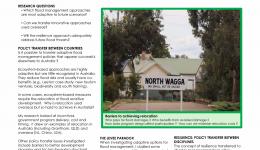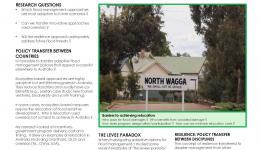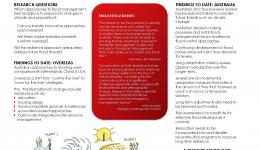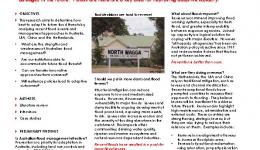Dr Caroline Wenger was one of the first CRC students to complete her PhD, graduating in May 2017. Focusing on flood management, Caroline investigated flood mitigation strategies used overseas to see which strategies could be best adapted in Australia. Her research identified institutional barriers and investigated whether disaster resilience policies lead to adaptive outcomes and used four international case studies of flood-prone countries: Australia, the USA, the Netherlands and China. Interviews were then held with Australian flood experts and case studies were verified by international experts to analyse the results.
Her research found that the adaptive management options used overseas, such as flood compatible development planning, relocation and floodplain restoration, face significant barriers in Australia. The results suggest that resilience policies need to be more discriminatory so they can more clearly support activities likely to be adaptive over the longer term.
By identifying institutional barriers and investigating whether disaster resilience policies lead to adaptive outcomes, Caroline’s research has the potential to be used by development planners and flood managers to aid selection of adaptive flood management options and could also be used to inform policy at different government levels.
Caroline now teaches casually at the Australian National University. Caroline’s PhD research was featured in Hazard Note 47 – Flood management in a changing climate.
Blog posts on Views & Visions
| Post | Date | Key Topics |
|---|---|---|
| Why you should do a three minute thesis presentation | 02 Oct 2015 | flood, governance, policy |
Student project
Population growth, urbanisation and climate change are magnifying flood risks on a global scale. These factors are likely to increase flood frequency, variability and severity for the majority of major global river basins. There is a risk that badly-planned, reactive responses to flooding may prove harmful in the long term. This research used international case studies to investigate which options are most robust to future flood scenarios. It identified institutional barriers and investigated whether disaster resilience policies lead to adaptive outcomes.








